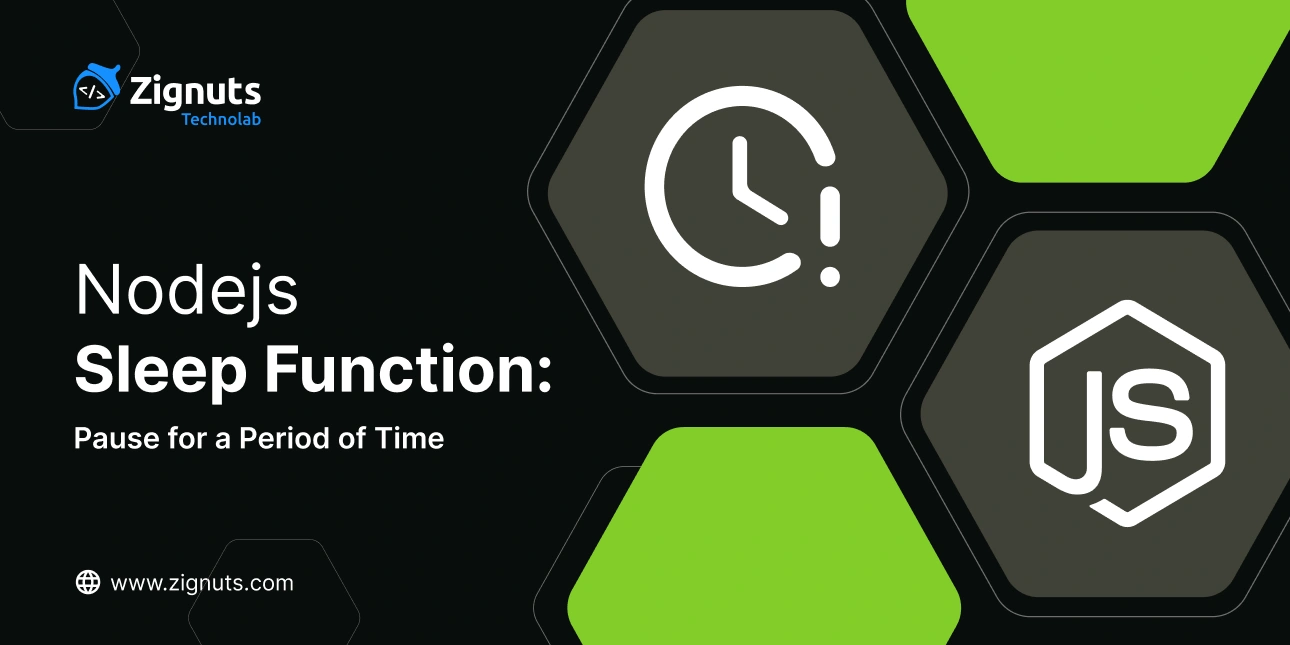Ever found yourself wishing you could just hit pause on your Node.js application? Maybe you're waiting for an API response, or perhaps you want to simulate a delay for testing purposes. Whatever the reason, introducing a sleep or pause functionality in Node.js can be incredibly useful. But how do you do it in a language designed around asynchronous operations? In this blog, we’ll explore how to create a sleep function, its use cases, and some best practices.
What is a Sleep Function in Nodejs?
A sleep or delay function is a programming feature that allows you to pause the execution of a program or a specific part of a program for a specified period of time. This can be useful in various situations, such as when you need to introduce a delay between two actions, create a time-based loop, or synchronize tasks in a multi-threaded application.
- The sleep or delay function typically takes a parameter, which is the duration of the delay in seconds, milliseconds, or microseconds, depending on the programming language and library being used.
- Once the function is called, the program will “sleep” or “delay” for the specified period of time before continuing its execution.
- However, unlike some other programming languages, Node.js does not have a built-in sleep function due to its asynchronous nature. There are different ways to create a sleep or delay in Node.js, depending on whether you want to block the thread or not.
Understanding the need of Nodejs sleep function:
The need for a sleep function in Node.js, arises from several practical scenarios where pausing execution for a predetermined period is beneficial or even necessary. While JavaScript and Node.js are designed around asynchronous operations to avoid blocking the event loop, there are situations where introducing a deliberate delay can be useful.
Nodejs Sleep Function: Common Use Cases:
Rate Limiting:
Pausing execution to avoid hitting API rate limits. A sleep function can be used to enforce the pausing programmatically.
Simulating Real-world Delays:
When testing the operations like network requests, file reads/writes, or database queries, using a sleep function can simulate these delays, allowing developers to test how their application behaves under realistic conditions.
Testing and Development:
During development and testing, introducing artificial delays can help simulate various states of an application, such as slow network responses or heavy load scenarios.
How to Implement a Sleep Function in Node.js:
Using SetTimeout:
- The SetTimeout function is the most straightforward way to introduce a delay in Node.js. This function schedules a callback to run after a specified number of milliseconds but does not block the execution of subsequent code. For example:
- This approach is straightforward but it is not preferred for large codebases, especially if you have to chain multiple asynchronous operations (commonly known as "callback hell"). For more complex scenarios, Promises or async/await are generally preferred. Which is discussed below.
Using Promise to create a sleep function:
- SetTimeout in a Promise is the most common and modern way to create a sleep function that behaves more like traditional sleep functions found in other languages. This allows you to use async/await syntax to pause execution within an asynchronous function.
- It takes a callback function and a time in milliseconds as arguments. The callback function will be executed after the specified time, but the rest of the code will continue to run.
- You can use it to create a sleep function that returns a promise, and then use it with async/await syntax. Here’s a simple example:
Using sleep-promise package:
- For those who prefer not to roll their own sleep function, several npm packages offer sleep functionality out of the box. One such package is “sleep-promise”, which simplifies the process of pausing Node.js programs.
- This package abstracts away the Promise-based sleep function, allowing you to easily introduce delays without manually creating Promises each time. You can install it using npm or yarn, and then import it and use it with await syntax.
- Before you begin, make sure you have Node.js installed on your system. If Node.js is not installed, you can download it from nodejs.org. Once you have Node.js set up, you can proceed with installing the sleep-promise package via npm:
- Once installed, you can easily use the sleep-promise package in your code:
Using execSync:
- execSync can create a sleep function in Node.js from the 'child_process' module, which allows you to execute shell commands synchronously. This method is a bit unconventional and also blocks the event loop, so it should be used with caution.
- It executes the shell command provided as a string and waits for it to complete before moving on to the next line of code. Here’s how you can do it:
- On Unix-like systems (Linux, macOS), the “sleep” command is used to pause execution for a specified number of seconds. On Windows, you would use timeout instead, as shown in the following code.
- The exact command used (sleep or timeout) is platform-dependent, meaning you’ll need to account for different operating systems if your code is meant to be cross-platform.However, this method is also not recommended as it depends on your OS and may have security risks.
Need expert help with your Node.js project? Hire Node.js Developers from Zignuts to implement efficient, scalable solutions tailored to your needs..
Nodejs Sleep Function: Conclusion
Node.js does not offer a built-in sleep function due to their asynchronous nature. For most Node.js applications, non-blocking alternatives like Promises with setTimeout or using the sleep-promise package are recommended to maintain responsiveness and performance. While execSync is a clever workaround, it's important to be mindful of its limitations and potential downsides in production code. In cases where you genuinely need to pause execution, the Promise-based sleep function or async/await pattern is preferable, maintaining Node.js's non-blocking behavior.




.svg)

.svg)



.svg)

.svg)


.webp)




.png)
.png)
.png)
.png)
.png)
.png)
.png)
.png)




